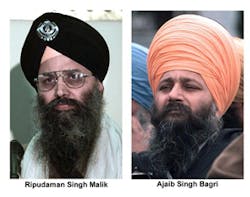Both Defendants Cleared in Air India Bombings
British Columbia Supreme Court Justice Ian Josephson said Wednesday that the prosecution's key witnesses were not credible. The bombings were the deadliest terrorist strikes before the Sept. 11 attacks.
''Words are incapable of adequately conveying the senseless horror of these crimes,'' said Josephson, who heard the case without a jury at the defendants' request. ''Hundreds of men, women and children were entirely innocent victims of a diabolical act of terrorism.''
Spectators in the courtroom, including dozens of victims' relatives, gasped when the verdicts were read. Some started wailing.
''Why did they even have this trial?'' said Rattan Singh Kalsi, 75, of London, Ontario, whose daughter was aboard the Air India plane. ''We were suffering anyway. Now we will suffer more.''
The defendants - Ripudaman Singh Malik, 58, and Ajaib Singh Bagri, 55 - were immediately released. Malik smiled as he swept through a crowd of reporters surrounded by police to a waiting car.
''If these men are not guilty. Then who killed all those innocent travelers?'' asked a sobbing Mukta Bhat, who lost her son, daughter-in-law and 6-month-old grandson in the attack. ''Who will answer for all our years of pain?''
''It's simply not fair. I can't believe this. ... It's too sad,'' she said adding that the trial had raked up more pain for relatives of victims.
Like many others across India, Bhat, 73, of Bombay, stayed up past midnight Indian time to learn the verdict, receiving the news from a Canadian official.
''They (the accused) changed our lives, the verdict couldn't change it more,'' Amerjeet Singh Bhinder, wife of co-pilot N.S. Bhinder, told the Star News television channel. ''Still, we expected justice.''
But Malik's relatives and friends in his native town Ferozepur in India cheered the news. ''We are very happy. Our prayers to God have been answered,'' said Malik's aunt Surinder Kaur, who believes her nephew is innocent.
Air India Flight 182 from Montreal to London, originating in Vancouver, exploded and crashed off Ireland on June 23, 1985. All 329 people on board, mostly Canadians, were killed.
An hour earlier, a bomb in baggage intended for another Air India flight exploded in the Narita airport, killing two baggage handlers.
Speaking on behalf of the families, Susheel Gupta, who lost his mother on the flight, called on the Canadian government to conduct a public inquiry into the case.
''This was murder pure and simple,'' he said. ''Murder. Murder in any system demands justice.'' ''Through no fault of their own in traveling to India and no fault of ours, our loved ones never came home.''
Prosecutor Robert Wright maintained that the bombing was revenge by Sikh separatists for a deadly 1984 raid by Indian forces on the Golden Temple at Amritsar, the holiest site in their religion.
Bagri, a ''militant Sikh terrorist,'' gave a speech in New York that urged the killing of Hindus in the drive for a separate Sikh state of Khalistan, Wright said.
In a July 21, 1984, speech at Madison Square Garden, Bagri said: ''Until we kill 50,000 Hindus, we will not rest.''
In their opening statements starting April 28, 2003, lawyers for Bagri and Malik said prosecutors had a weak case that hinged on the testimony of three star witnesses and bomb experts.
Josephson dismissed the credibility of prosecution witnesses, including a woman who said Malik told her of a plan to smuggle two bombs on flights from Vancouver that would be transferred to two Air India jets.
Josephson said the testimony of the woman, who claimed she and Malik were in love, was at the heart of the case against Malik.
But on greater examination, he said: ''I find that she has not been truthful with the court and that I am unable to rely on her.''
The woman remains in a witness protection program.
Josephson gave similar assessments about many of the other major prosecution witnesses. The star witness against Bagri had testified the accused told him, ''We did this,'' when talking about the bombing outside a New Jersey gas station.
Josephson, however, said the man was motivated by self-interest.
He was willing ''to engage in deception and lies, even under penalty of perjury, whenever he believed it would advance his self-interest,'' he said in dismissing the evidence.
Reporters were barred from identifying any of the witnesses.
Investigators believe the Air India bombing was masterminded by Talwinder Singh Parmar, leader of the extremist Babbar Khalsa group that advocates creating a Sikh state called Khalistan in India's Punjab region. Parmar was killed by Indian police in 1992.
Malik worked as a taxi driver after arriving in Canada from India in 1972 and built up business holdings, becoming a driving force behind the Vancouver-area Khalsa Credit Union with assets of more than US$1 million.
Bagri arrived in Canada in 1968, according to court documents, and was a mill worker.
A third man in the case, alleged bomb-maker Inderjit Singh Reyat, pleaded guilty Feb. 10 to one count of manslaughter and was sentenced to five years in jail.
After Reyat's guilty plea, Malik and Bagri chose a trial by judge. Reyat previously served a 10-year sentence for his 1991 conviction in the Tokyo airport bombing.
A fourth man, former Vancouver Sikh Temple president Hardial Singh Johal, was arrested but not charged in the case. He has since died.
